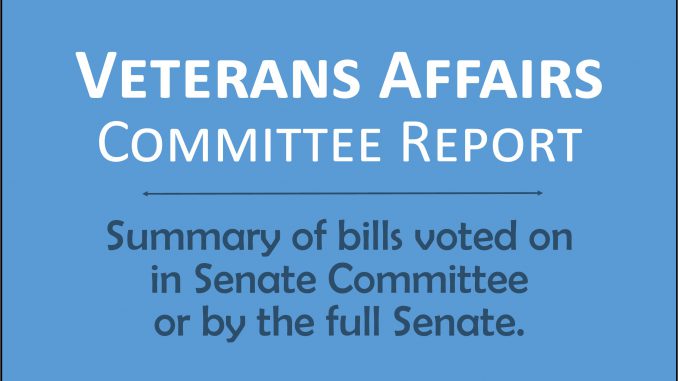
SF 485 – Property tax exemption
SSB 1065 – Injured veterans grant parameters; professional licensure
SSB 1127 – Hyperbaric treatment pilot program
COMMITTEE ACTION:
SF 485 – Property tax exemption
SF 485 (SSB 1022) increases the military property tax exemption. Under current law, honorably discharged veterans who served during specific time periods are entitled to a property tax exemption of $1,852 in taxable value. This bill increases the exemption amount for all eligible veterans to $3,700. The state provides funding to local governments for the military service property tax exemption and credit up to $6.92 per $1,000 of assessed value of the exempt property.
Code section 25B.7 provides that if a state appropriation made to fund a credit or exemption is not sufficient to fully fund the credit or exemption, the political subdivision must extend to the taxpayer only that portion of the credit or exemption estimated by the Department of Revenue to be funded by the state appropriation. The requirement for fully funding and the consequences of not fully funding under Code section 25B.7 apply to the military service property tax credit and exemption to the extent of $6.92 per $1,000 of assessed value of the exempt property. It applies to property taxes due and payable in fiscal years beginning on or after July 1, 2020. The bill will be referred to the Ways and Means Committee.
[3/5: short form]
SSB 1065 – Injured veterans grant parameters; professional licensure
SSB 1065 is an Iowa Department of Public Defense recommendation. Currently, Iowans serving in the Iowa National Guard, Reserve or regular component of the U.S. Armed Forces who are deployed overseas and seriously or very seriously injured in the line of duty while in a combat zone or hazardous duty pay zone are eligible to apply for an Injured Veterans Grant. In recent years, the Department of Defense has categorized some areas as “Overseas Contingency Operations,” including Kuwait, Kosovo and Djibouti. The requested legislation modifies eligibility to allow those deployed in any region outside of the United States who are injured and evacuated to be eligible to apply for a grant while the injured veteran is hospitalized or receiving medical care or rehabilitation services authorized by the military. The Legislature established the program beginning in 2007, retroactive to September 11, 2001. Grants are paid in increments of $2,500 up to a maximum of $10,000. Most receive $2,500 to help family in the first month when the service member is medically evacuated to a hospital. Additional money may be given for longer periods (30 days, 60 days, 90 days) of hospitalization, medical treatment and rehabilitation services by the military or Veterans Administration.
The proposal also establishes an expedited licensing process for spouses of active duty members of the U.S. military who are stationed in Iowa. It provides that licensing boards establish provisional licensing procedures by January 1, 2020 to expedite the licensing of an individual who is licensed in a similar profession or occupation in another state and who is the spouse of an active duty member of the U.S. military. The secretaries of the U.S. Navy, Air Force and Army are asking governors and legislators in all states to adopt such guidelines.
The Committee amended the proposal. The minimum balance of the Veterans Trust Fund (VTF) required prior to expenditures is $5 million. Once that is reached, the interests and earnings on the VTF and the first $500,000 is transferred each fiscal year from the Iowa Lottery. The amendment increases that to the first $600,000. The Commission of Veterans Affairs will transfer $100,000 to the Injured Veterans Trust Fund each year if the fund balance is less than $1,000,000 on June 30 of a fiscal year. If the balance is $1,000,000 or more, no money will be transferred in a succeeding fiscal year until the balance is below $700,000.
The House version, HF 288, includes a study on future funding. The Iowa Department of Veterans Affairs, the Commission of Veterans Affairs and the National Guard are to collaborate on a report regarding the sustainability of future funding for the injured veterans grant program with a written report due to the Governor and Legislature by December 31, 2019.
[3/5: short form]
SSB 1127 – Hyperbaric treatment pilot program
SSB 1127 creates veterans recovery pilot program for providing hyperbaric oxygen treatment with oversight by the Department of Human Services (DHS) and establishes a Veterans Recovery Fund in the State Treasury under the control of the Iowa Department of Veterans Affairs (IDVA). The bill defines hyperbaric oxygen treatment and authorizes it as a diagnostic test and other related medical treatments for traumatic brain injury or post-traumatic stress disorder (PTSD) if prescribed by a health care practitioner who uses a hyperbaric chamber or hyperbaric oxygen device approved by the U.S. Food and Drug Administration. The health care practitioner can prescribe this treatment and propose a plan that includes hyperbaric oxygen treatment. The plan must include a cost estimate for treatment, as well as for travel and living expenses related to treatment. The proposal must be approved by DHS and IDVA. If there is enough money in the fund to pay for treatment and related expenses, the treatment plan will begin. The fund will reimburse expenses for providing hyperbaric oxygen treatment to eligible veterans. No state appropriations are needed. Donations, grants, gifts and other contributions will be deposited in the fund. No veteran will receive treatment until there are sufficient funds to cover the cost. DHS must submit notice of intended action to the administrative rules coordinator and administrative code editor by January 1, 2020 for rules to implement and administer the new Code chapter. The pilot program sunsets on July 1, 2025.
[3/5: short form]
